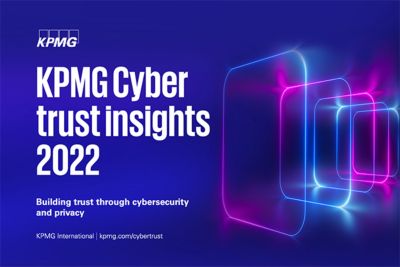To today’s businesses, trust is everything. In an uncertain, constantly shifting environment, customers, employees and investors look for organisations they can depend on. But building and protecting that sense of trust requires many parts of the organisation to work together to deliver a consistent unified vision.
Now that we live in a digitised world, every part of the business depends on fairness, integrity and transparency in the way information is collected and processed. Systems should be resilient, dependable and able to respond quickly in the face of disruption. Whether you are a customer or client who wants to feel safe when transacting with the organisation, or part of the broader ecosystem of partners, investors, regulators and society surrounding every organisation — digital trust matters.
Cybersecurity and privacy have a pivotal role in building and maintaining that trust. Businesses are ramping up data collection, expanding the use of artificial intelligence (AI) and machine learning (ML) technologies and embracing the environmental, social and governance (ESG) agenda, all while facing increasingly exacting regulatory standards.
KPMG cyber trust insights 2022
In this latest research — Cyber trust insights 2022 — KPMG International surveyed 1,881 executives and held a series of discussions with corporate leaders and professionals from across the world to explore the extent to which the C-suite recognises this, how they are meeting the challenge, and what they need to do next. It also explores the key role chief information security officers (CISOs) can play in helping them and identifies five crucial steps to help build trust through cybersecurity and privacy.

Cyber trust insights 2022
Read the full report for additional insights on how to build trust through cybersecurity and privacy.
Download PDF (662 KB) ⤓
Key findings
Ireland
Cybersecurity's role in driving trust. (PDF, 1.4MB)

Global
How organisations can drive trust via the CISO. (PDF, 386KB)

Americas
How to boost trust with ethical AI. (PDF, 559KB)

Asia Pacific
Protecting business reputation through data governance. (PDF, 487KB)

Europe, Middle East and Asia
Cybersecurity's role in driving trust. (PDF, 409KB)

Irish insights
Building and protecting trust is integral to how businesses operate and interact with stakeholders. And with that trust comes several commercial advantages; according to KPMG’s 2022 ‘Cyber Trust Insights report, 40 percent of Irish executives believe stronger commercial relationships were the most significant advantage, followed by improved profitability (38 percent) and better employee retention (32 percent).
Half of the Irish, global and EMEA executives see information security as a necessary cost rather than a way to gain a competitive advantage and view the CISO's role not as strategic as it should be. Fifty-two percent of Irish executives do not fully understand the competitive benefits of enhancing trust through better information security. And 80 percent say increasing trust across the stakeholder spectrum is a leading consideration for their cyber-risk programme.
To engage at a senior level, CISOs should focus on the needs of the business and aim to ensure cyber is seen as a golden thread that runs through every aspect of business strategy, planning, investment and delivery.

Digital trust
Irish executives believe there are advantages of collaborating on cybersecurity across the broader ecosystem, including better alignment and response to changing regulatory requirements (50 percent), increased confidence in relationships with external partners (48 percent) and a reduction in the time it takes to identify data breaches (46%). Eighty-six percent of Irish executives maintain that education and engagement of their customers in cybersecurity is key to their organisation's cybersecurity, compared to three-quarters of global and EMEA executives.
Digital trust should be part of the ESG agenda, and cybersecurity and privacy will likely be part of that. As ESG is integral to the business, the CISO will play an essential role in social and governance-related issues. Companies need to recognise the social imperatives and growing expectations around these topics and individuals responsible for ESG should work collaboratively with those responsible for cybersecurity. Forward-thinking organisations are incorporating data privacy metrics into ESG reporting frameworks, enabling them to build trust while helping to ensure regulatory requirements are met at a minimum.
Digital trust should be part of the ESG agenda, the CISO will play an essential role in social and governance-related issues.

Five crucial steps to building trust through cybersecurity and privacy
Executives understand why it's important to increase trust in their organisations and ecosystems, and they're looking to the CISO to be one of their champions. Cybersecurity and privacy are key elements in driving trust in the minds of customers, regulators and the public through the ESG imperative. CISOs understand their responsibilities, but the research shows that many struggles to fulfil them. CISOs are well placed to help their organisation navigate these challenging waters but need stronger support from senior leaders and be fully embedded within the business' mid and long-term strategies. In future, the C-suite and the board must work more effectively with security teams to drive the trust agenda. This will mean positioning the CISO as a strategic enabler within the organisation — rather than as a technical expert – the CISO is key to building digital trust.
How should they go about this?
Weave cybersecurity and privacy into the business processes, governance and culture of the organization – making it integral to business rather than a compliance-driven overhead.
Work with colleagues such as the chief data officer and the chief privacy officer to help establish, embed and sustain digital trust.
Embrace the broader agenda and recognize the ability to make wide ranging contributions in areas ranging from ESG to the ethics of AI.
CISOs who win the support of the C-suite and the board are likely to find it easier to help drive the trust agenda. This means transforming the CISO from a narrow technical role to a strategic enabler within the organization.
Identify key partners within the organization’s ecosystem and collaborate closely with them to help improve trust and resilience.
Perspectives from KPMG leaders

Cyber trust insights 2022
Read the full report for additional insights on how to build trust through cybersecurity and privacy.
Download PDF (662 KB) ⤓

Cyber security is about what you can do, not what you can’t
Cyber security is about what you can do, not what you can’t
More in Cybersecurity
Get in touch